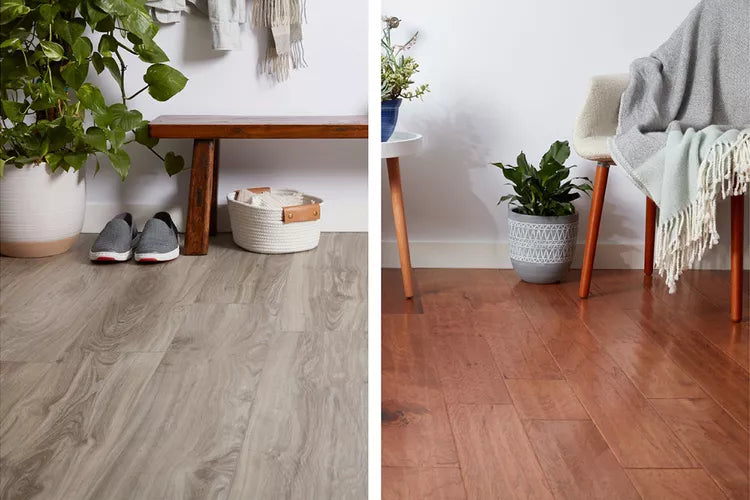
Why We Chose LVP Flooring Over Hardwood or Engineered Hardwood for Our Custom Home
When it came time to choose flooring for our custom home, we wanted something that was beautiful, durable, and practical. With two energetic golden retrievers and a snowy climate, our floors needed to withstand daily wear, moisture, and the occasional muddy paw print. After much consideration, we opted for luxury vinyl plank (LVP) flooring. We chose a higher-end option from Duchateau, and we couldn't be happier with the decision.
But why LVP? Let’s break down how it compares to both traditional hardwood and engineered hardwood to explain why it was the perfect choice for our home.
Traditional Hardwood: Timeless, But High Maintenance
Hardwood floors are undeniably beautiful and add timeless warmth to any space. However, they come with their own set of challenges, especially in homes with pets or children.
Pros:
-
Classic, elegant appearance
-
Can be refinished multiple times
-
Increases home value
Cons:
-
Prone to scratches and dents
-
Susceptible to water damage
-
Expensive
-
High maintenance
In a snowy climate like ours, hardwood floors can easily warp or stain when exposed to moisture. Plus, with two golden retrievers running around, scratches are inevitable.
Engineered Hardwood: A Middle Ground
Engineered hardwood consists of a thin layer of real wood on top of a plywood or composite core. It offers the appearance of solid hardwood but with slightly improved durability and moisture resistance.
Pros:
-
More stable in humid or wet environments
-
Can be refinished (depending on the top layer thickness)
-
Provides the look of hardwood at a lower cost
Cons:
-
Still prone to scratches and dents
-
Limited refinishing capability
-
Often more expensive than LVP
While engineered hardwood is a more practical choice than solid hardwood, it still falls short in terms of durability and water resistance, especially in a pet-friendly home.
Luxury Vinyl Plank (LVP): The Best of All Worlds
LVP has surged in popularity over the past few years—and for good reason. It offers the beauty of hardwood with unmatched durability and water resistance. Recent reports show that LVP has even surpassed traditional wood as the top flooring choice, accounting for nearly 24% of the market compared to hardwood's 20%.
Pros:
-
100% waterproof
-
Scratch and dent resistant
-
Budget-friendly compared to hardwood and engineered hardwood
-
Low maintenance
-
Realistic wood-look designs
-
Softer and quieter underfoot
Cons:
-
Cannot be refinished
-
May not add as much resale value as hardwood
Why LVP Was the Right Choice for Us
Living in a place with lots of snow means wet boots and paws are a regular occurrence. The waterproof nature of LVP flooring has been a game changer. It handles moisture without warping or staining, making it ideal for our entryways and high-traffic areas.
Additionally, with two dogs who love to zoom around the house, we needed something resistant to scratches. LVP’s protective wear layer ensures our floors remain looking pristine, even with daily activity.
We also opted for a premium LVP from Duchateau, which offers stunning wood-look designs that rival the appearance of real hardwood. The textured finish and wide planks give our home the elegant, natural look we wanted, without the upkeep.
Final Thoughts
While traditional hardwood and engineered hardwood both have their advantages, LVP flooring offered us the perfect balance of durability, style, and practicality. It’s a decision we feel great about every time we step inside—especially knowing our dogs can play without worry.
If you're building or renovating your home and considering flooring options, I highly recommend exploring LVP. It’s a choice that brings both beauty and peace of mind, no matter what life (or your pets) throw its way!
Check out my Instagram for more custom home inspo!
